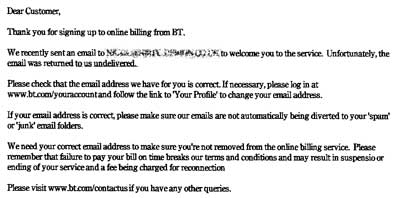I recently received a letter from British Telecom (BT) thanking me for signing up with their online billing service. They wrote: “We recently sent an email to XXXX@XXXXXXXX to welcome you to the service. Unfortunately, the email was returned to us undelivered”.
The only problem is; I have never signed up for online billing! And it is no surprise that the email address they are using is bouncing the emails, because it is nearly 6 years since I closed that account!

So is this a devious way of trying to get people to sign up? When I did log in to my online account (not the same as requesting online billing, you understand) the system did cleverly recognise that I needed to update my email, and prompted me for a new email address straight away. Nothing that’s rocket science, of course, nevertheless a sensible thing and one that you won’t often see in ‘version 1’ of a website.
Confirming my suspicions, one of the next questions I was asked was “Would you like online billing?”
If I’d already actually asked me for that, and I had agreed, they would perhaps have told me that I had signed up for online billing (and of course, being a truly accountable company, they would probably have liked to tell me when I had asked for it; e.g. “When you called us on 15th February, you asked us to use online billing! We’ve signed you up, and if you would like to learn more, click here” blah blah blah. Oops there goes the sarcasm again.
A second point I noticed about the letter was that it went on to say:
If your email address is correct, please make sure our emails are not automatically being diverted to your ‘spam’ or ‘junk’ email folders.
But wait. If they sent me this letter because my emails had been returned undeliverable, then it was for one of the following reasons that come to mind:
- My email address is wrong;
- My email account is full (space limitations);
- Some other factor that temporarily disables accounts receiving emails (e.g. delayed payment for email service).
Not one of those reasons relates to spam identification issues, the implication of which is that the email was received and therefore was not returned to BT. I’m not an email expert, but I believe it is generally considered that replying to or bouncing spam emails is a waste of time because it invariably is not from who it says its from… so it is difficult for me to see the relationship between the two parts of the letter.
Summary
So my suspicion is that there are some moves at BT to get their customers onto online billing (it will undoubtedly save them loads per year in paper and printing and postage costs), so they set about asking their customers with email addresses to sign up. They might have done that appropriately for people who had current email addresses (“Hey, why not sign up for wonderful online billing!”) but when those emails bounced, they got picked up by the ‘bounce’ system that made assumptions that the customer had actively requested online billing.
For a big company like BT, I can’t see why their IT can’t be flexible enough to have several letters that are sent when different events occur; one for emails bounced back to them, another for emails that consistently do not result in a requested action (as would happen for emails getting id’d as spam) and so on. In this case, the letter did not fully address the reasons why an email might be bounced back to them, and instead introduced other unconnected reasons why a customer might not see an email their system had actually received.
But whatever the reason, I really Hate being told I have done something when I am 99% sure that I haven’t!